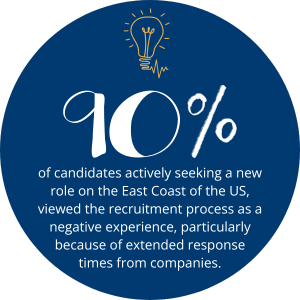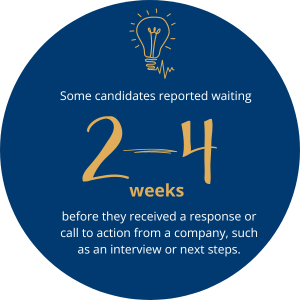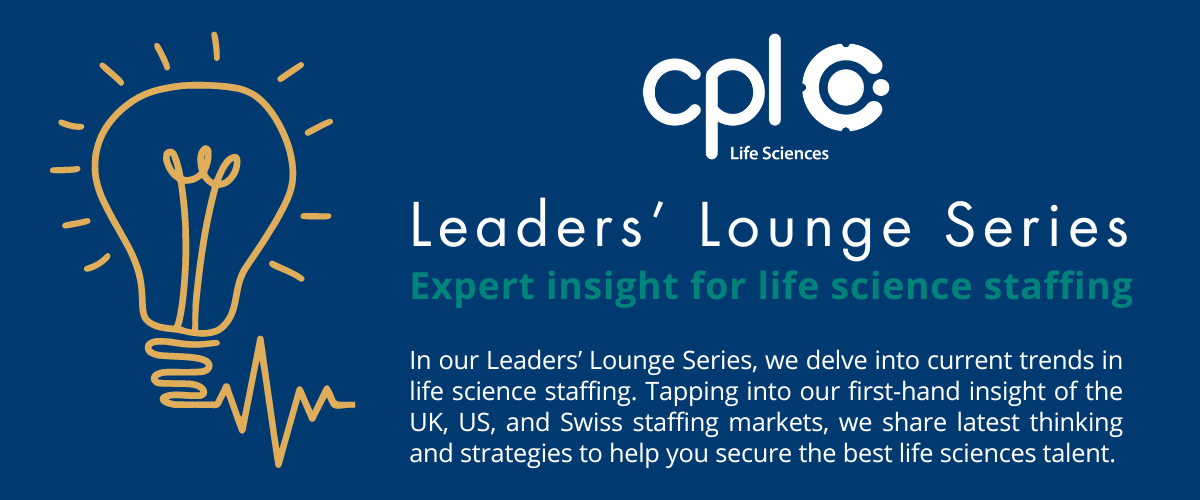In this Leaders' Lounge article, we explore the reasons US life science companies could be missing out on top talent.
Ever find yourself consistently failing to find and hire industry leading life sciences talent? Critical roles open for over six months? Just can’t figure out why great candidates keep going elsewhere?
At the heart of attracting top talent lies the Employee Value Proposition (EVP), a unique package of benefits that employees receive in exchange for their skills and experience. Factors such as total rewards, compensation, company culture, career growth opportunities, and societal impact all play a crucial role in appealing to exceptional candidates.
Despite the efforts of many organizations to evangelize their great business via their website, a significant number are failing to create a positive impression during the most crucial part of attracting top talent; the initial recruitment process itself.
In the highly competitive realm of Biopharma, where exceptional science companies strive to secure the best talent, the often-careless treatment of candidates during their journey into a business has emerged as a pivotal factor associated with failure. Lengthy delays in responding to job applications can have detrimental effects on candidates’ morale, perception of the company, and overall job search experience. A lack of communication following an application led to frustration, uncertainty, and a sense of disconnect, ultimately reflecting poorly on the company’s employer brand.

Do you know the really bad news about that? Candidates who have a really poor experience, tell a lot of people.
Cpl Life Sciences recently surveyed over fifty candidates actively seeking a new role on the East Coast of the US. Their feedback was incredibly insightful and disappointing for the life sciences industry. It revealed that the recruitment process for 90% of candidates was viewed as a negative experience, particularly because of extended response times from companies, if indeed there was any response at all. Often candidates found themselves waiting between two and four weeks to receive a response or call to action, such as an interview or next steps.
This left highly skilled candidates with unfavorable opinions of the organization, leading sometimes to anxiety and stress. The uncertainty surrounding the status of their application only heightened their feelings of unease and apprehension, particularly having read websites explaining how amazing an organization was and how it valued its people. Ultimately, this led some perfectly matched candidates to decline moving forward with an application or the applicant had offers of employment from elsewhere.


In sharp contrast, candidates responded very positively to the few companies that communicated promptly and made them feel valued throughout the recruitment process, even if rejecting them. Such organizations stood out for their care, responsiveness, and consideration, attracting candidates who may not have initially considered them as top choices. A flawed recruitment process not only tarnishes a company’s reputation but also affects its ability to attract and retain top talent. Respect and consideration during the hiring process are indicative of how candidates perceive the company as a potential employer. Neglecting this aspect can lead to reputational damage and hinder new starter employees, referrals and ultimately retention.
In a world where candidates seek organizations that align with their values and show care for employees and communities, a responsive and human-centric recruitment approach is essential. Timely responses, agility, and a seamless onboarding experience can significantly enhance a company’s reputation and appeal to top talent in a competitive market. Ultimately, investing in a candidate-centric recruitment process is paramount for organizations looking to attract and retain top talent.

Prioritizing responsiveness, agility, and a positive candidate experience from the outset can set a company apart in a crowded market and pave the way for long-term success in talent acquisition. If you are the cog in a company’s wheel that’s too busy to review a resume, book an interview, give feedback post interview quickly enough, you are the main problem. No company, even with a compelling Employer Value Proposition (EVP), can retain talent they failed to hire in the first place!
Our thanks to Cpl Life Sciences CEO, Yvette Cleland, and the Cpl Life Sciences US team for sharing their sector insight.
To discover more about the US life science staffing market or how we can help with your next hire, contact us today at cplUS@cpl.com
Source: Cpl Life Sciences Survey of more than 50 candidates actively seeking a new role on the East Coast of the USA.
